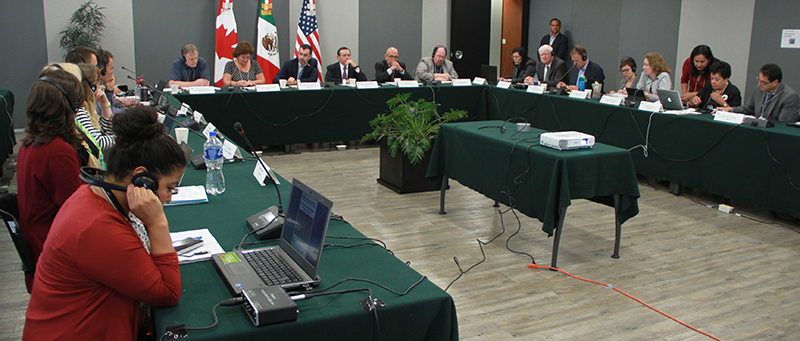CEC launches expert group to better measure food loss and waste in North America
Montreal, 22 May 2018—The Commission for Environmental Cooperation (CEC), in partnership with Environment and Climate Change Canada (ECCC), Mexico's Secretaría de Medio Ambiente y Recursos Naturales (Semarnat), the US Environmental Protection Agency (EPA), announces the creation of a new trinational expert group with the mandate of advancing the measurement of food loss and waste across the food supply chain in North America.
The first meeting of the CEC Food Loss and Waste Measurement Experts Group was held in Mexico City, Mexico, 15–17 May 2018, to consider methodologies and best practices to measure food loss and waste more effectively in the North American food chain.
In his inaugural statement, Jorge Carlos Hurtado Valdez, Mexico's Vice Minister for Environmental Promotion and Regulation said, “in order to truly combat food loss and waste, it is necessary to have the appropriate tools for decision-makers in the private and public sectors and in society, in general.”
“Measuring food loss and waste is vital to help the government, food industry, and businesses understand how much, where, and why food loss and waste is occurring, so they can prevent and manage it,” said César Rafael Chávez, CEC Executive Director.
During the three-day meeting, experts from Enviro-Stewards Inc., the Centre for Food Chain Excellence (CFCE), the Provision Coalition, Nestlé, Restaurantes Toks, the Waste and Resources Action Programme (WRAP), the World Bank, the World Wildlife Fund, and the World Resources Institute (WRI), as well as representatives from ECCC, Semarnat, EPA, and the US Department of Agriculture (USDA) provided key input for the development of two documents—a technical report and a practical guide—on how to better measure food loss and waste and calculate its environmental and socio-economic impacts.
The group of renowned experts will continue working together to support Canada, Mexico and the US in their efforts to measure food loss and waste at each stage of the food supply chain, and in a manner consistent with global standards.
About the CEC project Measuring and Mitigating Food Loss and Waste
Building on the results of its 2015–2016 North American Initiative on Food Waste Reduction and Recovery, the CEC is undertaking a new project with a redesigned focus on measuring and mitigating food loss and waste. Created under the CEC’s 2017–2018 Operational Plan, the project will also provide tools and education to prevent this type of loss and wastage and reduce impacts on food security, the economy, and the environment in North America.
To view our latest report on the state of food loss and waste in North America and our accompanying infographic, visit <www.cec.org/flw>.
For more information on the CEC’s innovative work on food loss and waste, contact David Donaldson, Head of the Green Growth Unit, at ddonaldson@cec.org.
